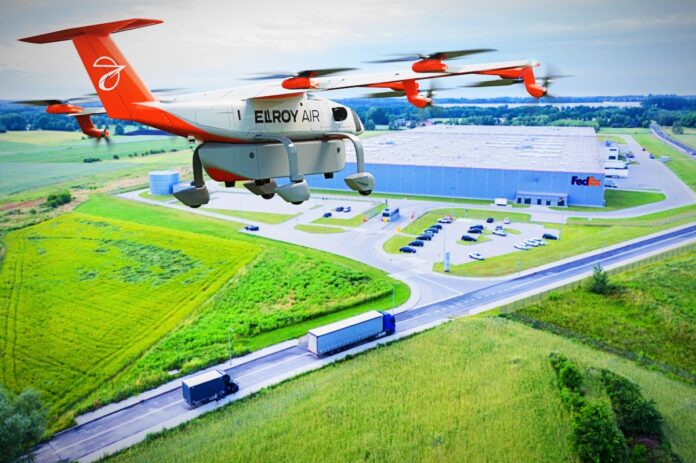FedEx Express, a subsidiary of FedEx, is working with California-based aerial cargo startup Elroy Air to launch test flights for autonomous drone cargo deliveries in 2023. The deal is billed as a “first of its kind agreement” in the US. FedEx Express said it will test Elroy Air’s Chaparral autonomous air cargo system within the company’s ‘middle-mile’ logistics operations, moving shipments between sortation locations.
The Chaparral project, announced in January, is presented as the “first end-to-end” autonomous vertical take-off and landing (VTOL) aerial cargo system. The Chaparral aircraft (pictured), electric and autonomous, can pick up 300-500 pounds of cargo and deliver it by air up to 300 miles, which outstrips the payload capabilities of delivery drones and does away with the kind of airport infrastructure required of piloted air deliveries.
The company has secured agreements for more than 500 aircraft from commercial, defense, and humanitarian customers, it claims; these deals are worth over $1 billion “in aircraft demand”. US regional airline operator Mesa Airlines, which handles fleets on behalf of American Airlines, United Airlines, and DHL, among others, has intent to order 150 aircraft to serve the express parcel and healthcare sectors, it said.
AYR Logistics, providing aircraft logistics support to the humanitarian community, including the United Nations and World Food Programme (WFP), has signed a deal to purchase up to 100 Chaparral aircraft. Elroy Air was awarded a Tactical Funding Increase (TACFI) Award from the United States Air Force in Q4 2021 amounting to an additional $1.7 million in contract value, alongside an existing small business innovation research (SBIR) contract. The funding will be used to develop deployments with Air Force and Agility Prime partners.
David Merrill, co-founder and chief executive at Elroy Air said: “The Chaparral is an important part of the future of express logistics. It is built for full end-to-end automation, and it will safely and efficiently make express shipping possible in thousands of new places. It’s a delivery drone that’s faster than ground transport and lower cost than today’s traditional aircraft.”
FedEx, working with Elroy Air since early 2020, talked up its innovation programme in a statement, to drive efficient transportation and logistics throughout all its supply chain. “FedEx believes that continued innovation and automation will improve safety, efficiency, and productivity for the company’s 600,000 team members as they continue to move the world forward,” it said. The company is working with Memphis-Shelby County Airport Authority in Memphis, Tennessee, to inspect cargo aircraft and airport perimeter security, as well as for on-site parcel deliveries.
Separately of drones, FedEx implemented a Bluetooth Low Energy (BLE) based asset tracking system, called SenseAware ID, for shipping of COVID-19 vaccines, as well as for other emergency pharmaceuticals and medical supplies. Customers in the aerospace and retail sectors are also able to access location data from the new tracking system, from initial launch in the US.
Joe Stephens, senior vice president for global planning, engineering and technology at FedEx Express, said: “FedEx was built on innovation and we are always looking toward new technologies to help enhance the logistics industry through improved safety, efficiency and customer service. We look forward to continued testing and learning throughout our collaboration with Elroy Air.”
Kofi Asante, vice president of business development and strategy at Elroy Air, said: “We are proud to work with FedEx to build the next generation of express logistics. When you’re not limited by challenging infrastructure, traffic, or airports, logistics can reach more people, faster than ever before. We look forward to working together to create a new future for how we get goods to people around the world.”

